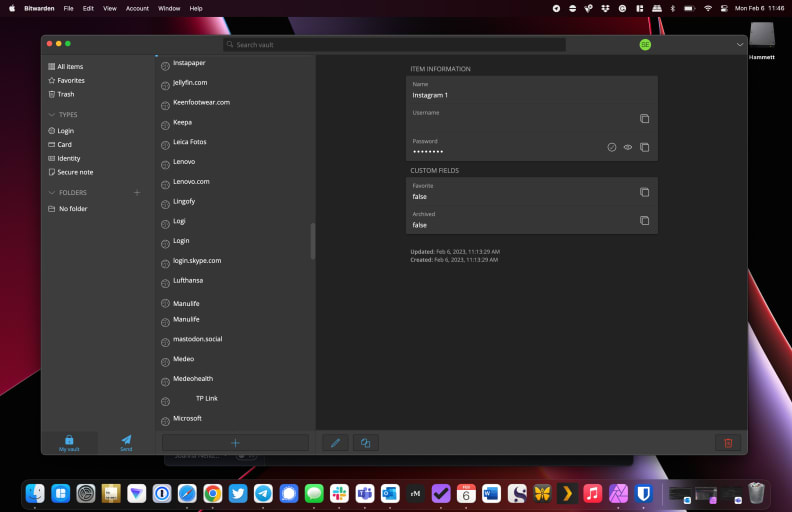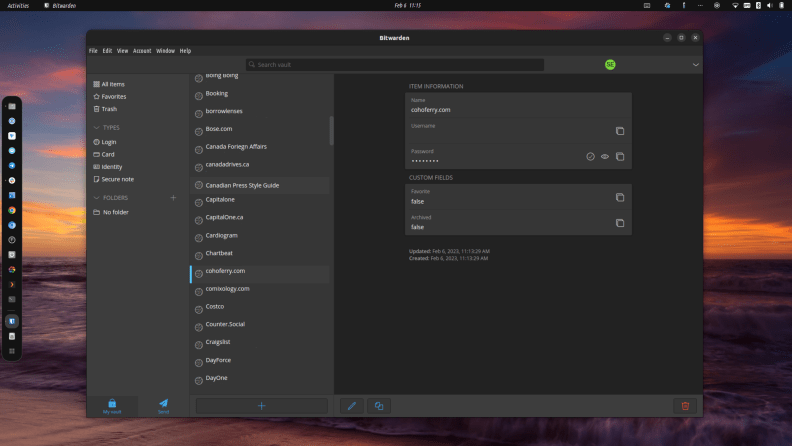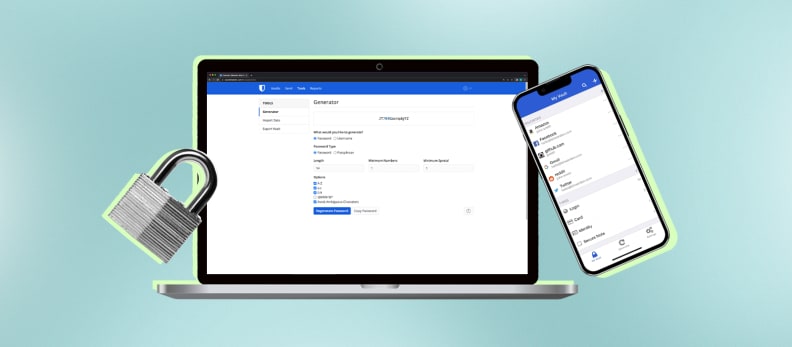While it might seem like a pain, having a different password for every online service that you use is the best way to ensure the safety of your personal information, finances, and your sanity. Having someone hack into your Spotify account and then use that same password to clean out your bank account isn’t going to do anything good for your quality of life. The best way to create and wrangle all of the passwords you’ll need to secure your online world is with a great password management tool.
Password managers do two things: they generate secure passwords for your online accounts and they securely store them so you don’t need to worry about remembering them yourself.
After weeks of research and testing eight of the leading personal password managers, both free-to-use and paid, we’ve chosen Bitwarden (available at Bitwarden) as the Best Overall option. Its robust feature set, for both its paid and free tiers of service, simplicity of use, and compatibility with multiple mobile and PC operating systems make it the best password management solution for most people.

Credit:
Reviewed / Séamus Bellamy

The best subscription-based password manager is Bitwarden.

Credit:
Reviewed / Séamus Bellamy

While it may lack some of the bells and whistles of Bitwarden’s premium offering, the free version of this password manager is outstanding.
Other Password Managers We Tested
What You Should Know About Password Managers

Credit:
Reviewed
Learning as much as you can about how to create and secure strong passwords will help you to feel confident, each time you log yourself online.
A good password manager will let you access your passwords (as well as software licenses, banking information, and other data that should be kept under a digital lock and key) on any computing device you own. All of the information secured by your password manager is safeguarded, ironically, by a single password—but having to recall one single password instead of hundreds is a huge win both for your hard-working brain and your online data security.
As password management software might be something that you’ve never dealt with in the past, we’re sure that you’ll have a lot of questions about it. Fortunately, we’ve got answers.
Why Not Just Use A Browser’s Password Manager?
Browsers like Chrome, Firefox, and Safari have a password management system built into them that essentially do the same things a third-party password manager does. So why not use them?
Well, you can, but it might be missing the tools that you need. While some browsers come with a password generator baked into them, where a browser’s password management differs from a third-party password manager is in its sophistication. Features like secure password generation, the ability to choose the passwords generated, two-factor authentication, the ability to share passwords with other users, and password syncing across devices, might not be available.
What Features Should I Look For in a Password Manager?
Any password manager you choose should have a basic set of features: the ability to secure all of your passwords behind one master password; cross-device password sharing and, the ability to edit saved passwords, as required. Beyond that, it’s going to depend on what you need, what you want, and what compromises you’re willing to make.
Look for any or all of these advanced features :
Password Generator: A password generator is used to create strong passwords on the fly, which be assigned to a website and username and then stored in the password manager. A password generator also makes it easy to customize generated passwords to suit the security requirements of individual websites. Need a password that has at least 16 characters and contains numbers, letters, and special characters? A password generator can create one for you.
Form and Payment Autofill: Some password managers can store addresses and payment information. This is a handy feature if you do a lot of online shopping or have a home business that involves a lot of shipping. This address and payment information is kept safely encrypted until it’s needed to automatically fill in a web form, which saves you time and offers peace of mind.
Weak/reused/compromised password check: Having a single strong password you use across multiple services is just as bad as having a weak one. Worse still is having one that’s been hacked and posted online. Some password managers will check for these to help you shore up holes in your security.
Automatic Password Changer: Frequent password changes are a hallmark of good security. Some password managers will monitor when you change an existing password and give you the option of automatically updating the information.
Password Sharing: At some point you’re going to want to give someone access to one of your passwords, whether it be for work, a streaming site for your family, or just in case something goes wrong. Some password managers allow you to securely share passwords with other users.
In addition to these must-haves, consider the number of devices you can use with a single account, the availability of multi-factor authentication, how many passwords the software can support, and what you can do if you lose your master password. Also, consider looking for a password manager that supports unlimited devices and unlimited passwords. (All of them do at some level, either free or paid.)
How to Create a Strong Master Password
Your master password keeps what you’ve secured in your management software safe. If someone gets hold of your master password, then they have access to all of your passwords, so you’ll want to make sure your master password is virtually hack-proof.
The most secure method for creating a good master password is to use a random password generator( a feature all of the password managers in this guide support.) This takes the burden of having to come up with a strong password off your shoulders and can be tailored to your login requirements.
As a rule, a strong master password should:
- Include at least 12 characters. (The longer the better.)
- Include numbers and uppercase and lowercase letters. Doing so makes the password far more difficult to crack.
- Include at least one special character, such as an exclamation point or question mark.
How to Create a Terrible Master Password
If you’d rather make your own password, we understand; you’re an independent spirit that prefers to go your own way.
As you create your security credentials, avoid using any of the following options as part of your password. They’re easy to guess and, in some cases, contain information that could be used to gain access to vital personal information as part of a social engineering attack:
- Your name
- Your pet’s name
- Your birthday
- Your anniversary
- Your Social Security Number
- Any word found in a dictionary
- Any word where you can replace a letter with a number (a1rplan3, for example)
- A simple sequence of numbers like 11111 or 12345
- A sequence of keyboard characters like QWERTY.
Once you have a great password, don’t write it down, save it to a web forum\ or tell anyone what it is—your password is only secure if it’s kept a secret. To keep your information locked down even further, consider changing your master password every three to six months. Definitely change it, or any other password, if you suspect that the password has been hacked. Even if you don’t have proof of a security breach, it’s better to be safe than sorry.












